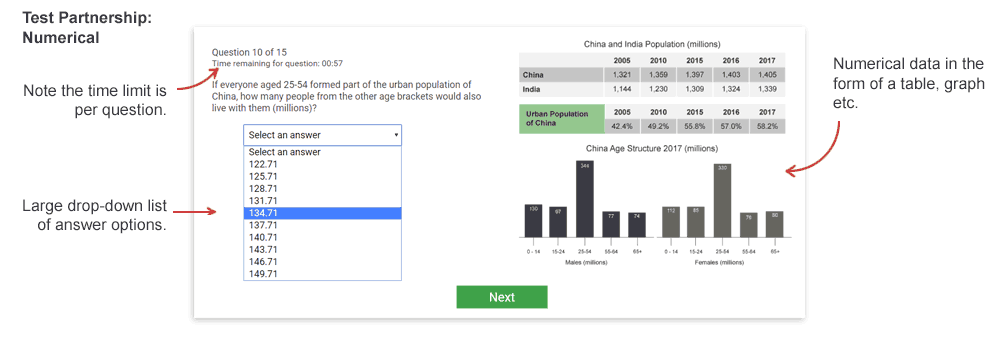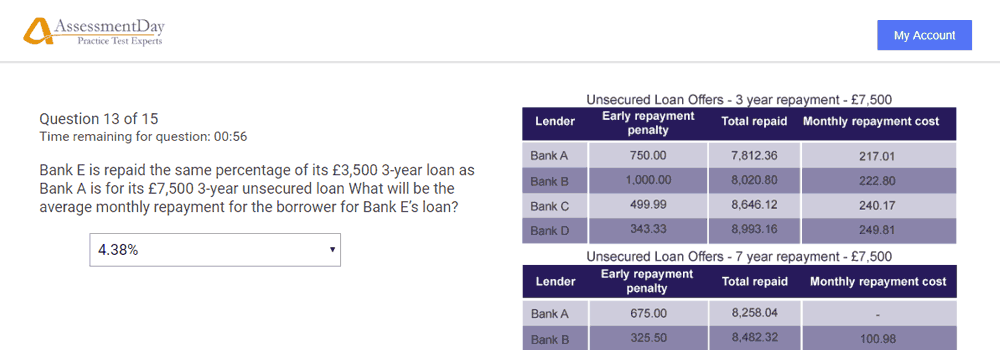Test Partnership Numerical Reasoning Tests
Practice tests, solutions, and tips to help you pass employers' numerical reasoning tests.



Page contents:
Jump to:Updated:
Test Partnership numerical reasoning practice tests
Does your job application require you to pass a Test Partnership numerical reasoning test? This page should give you all the practice and advice you need. Our practice tests are created by the same psychologists who design tests for the likes of SHL, Kenexa, Talent Q, and Saville Assessment. So our test platform and example questions will give you a good feel for the numerical tests that Test Partnership use. Performing your best in your Test Partnership numerical reasoning test is all about practice, and knowing what to expect!
Here are screenshots of our numerical reasoning tests:


What you should know before taking your Test Partnership numerical reasoning test
With thousands of job applicants to choose from, it's common for employers to use aptitude testing to sift the good candidates from the mediocre. The most common way for employers to use numerical reasoning tests is online, after they have accepted your CV or initial application form. If you pass your online test larger employers tend to then invite you to an assessment centre. Often employers ask you to sit a repeat test at the assessment centre to verify that you are indeed the same person who scored that great score on the online test, so don't get your friends to help with your online test!
As well as taking example tests, you should read the advice and findings below on how these tests work and what they measure.
By taking example numerical reasoning tests you will become familiar with the question format. Luckily for you most employers use a similar format of numerical reasoning test, which means it's easy to get some realistic practice beforehand.
The great thing about the Test Partnership numerical reasoning tests used for employment selection is that they are not the same as a maths test. You don't have to remember formulae or write long proofs. The important characteristics of a Test Partnership numerical reasoning test are its answer options.
There will be 10 answer options for the questions. Only 1 will be correct. Therefore, there will be many distractors. This means that you must concentrate on your working it out properly, rather than guessing randomly.
Free example numerical reasoning test
Free Numerical Reasoning Test
FreeThis free shortened numerical reasoning test contains 12 questions and has a time limit of 12 minutes. This test is rated as medium and is about the same difficulty as real numerical tests graduate employers use.
Numerical Reasoning Test 1
Premium- 30 questions
- 30 mins
Numerical Reasoning Test 2
PremiumNumerical Reasoning Test 3
PremiumNumerical Reasoning Test 4
PremiumWhat maths do I need to know for my numerical reasoning test?
The difficulty level of the maths involved in a numerical reasoning test is only about as difficult as GCSE level. The tricky part is interpreting the numerical data and figuring out what calculation is required, under the pressure of the count-down timer. Here is a list of the most common operations you can expect in your numerical test:
- Addition
- Subtraction
- Multiplication
- Division
- Percentages (including percentage changes)
- Ratios
If you don't feel comfortable with any of these questions, focus your practice on that type of question. You could also dig out your GCSE notes if you still have them. And remember you are more often than not allowed to use a calculator with these tests.
Try to work both quickly and accurately during your test. Most tests don't employ negative marking but some new tests are starting to, so ask the test administrator about this before you start. Whilst they might not tell you, bare in mind that your accuracy score is visible to the employer, so guessing answers will result in a low accuracy score and may suggest to the employer that your numerical work is prone to error.
Research has shown that people who do well in their numerical reasoning test tend to perform better in the job. That's precisely why employers use them!
Graduate and professional level numerical reasoning tests are the most difficult, reflecting the calibre of candidate they are trying to select. They still use only the seven basic maths skills listed above but they require you to analyse and interpret more advanced data, and they have several steps to the same question.
Join those now working at top companies
Don't settle for 'try again next year'. Let us help you pass employer tests first time.
Try now for free
Numerical test takers' FAQs
Q: Are calculators allowed?
Yes, for the typical graduate or middle-management numerical selection tests. But there's no harm in asking the employer this question before your test to ensure that during your practice, you can either use one or practice your mental arithmetic. If you are taking your numerical reasoning test at an assessment centre everyone will be lent an identical calculator to use to standardise the testing experience. Most test administrators do not allow the use of your own calculator, however it is a good idea to take you own just in case they do allow it. By using your own calculator you will be familiar with the button layout and functions so you will save a few vital seconds during your test. If your test is online, obviously you get to use your own calculator.
Q: Will I get marked down for incorrect answers?
This is a frequently-asked question by candidates is "will negative marking be used?" Most candidates want to know if it is sensible to guess the last few questions if time runs out. The answer is that negative marking is unlikely to be used, but accuracy will be assessed so don't just frantically click answers in hope. Some online tests have software which tries to detect guessing and will flag this up to the assessor. Even if they don't know that you're guessing, you are risking a low accuracy score, which might reflect badly on your attitude to work. Few assessors will reveal whether negative marking will be used, they will just say "try to answer correctly as many as you can". The test results will tell the assessor what percentage of attempted questions you got right. Some companies will be looking to select candidates with accurate and consistent results, while others will be more interested in quantity of correct results and speed. Have a think about what sort of person they are looking to recruit.
Q: Should I get my friends to help with my online test - surely they'll never know?
Application processes that require the candidate to sit an online numerical reasoning test and then subsequently another follow-up test at the assessment centre often use candidate verification methods. This is an automatic system which tries to verify that the online test was indeed completed by the same candidate that attends the assessment centre. So don't get your friends to help with your online test because they will probably work it out when you attend the assessment centre!